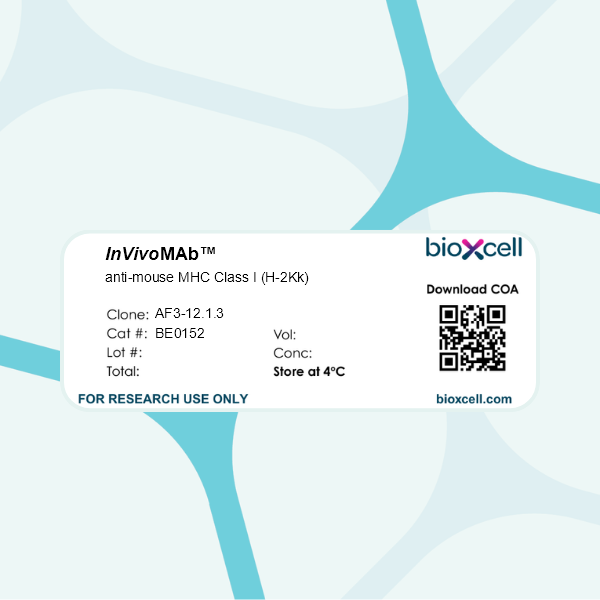InVivoMAb anti-mouse MHC Class I (H-2Kk)
Product Description
Specifications
| Isotype | Mouse IgG1 |
|---|---|
| Recommended Isotype Control(s) | InVivoMAb mouse IgG1 isotype control, unknown specificity |
| Recommended Dilution Buffer | InVivoPure pH 7.0 Dilution Buffer |
| Conjugation | This product is unconjugated. Conjugation is available via our Antibody Conjugation Services. |
| Immunogen | A/J mouse spleen cells |
| Reported Applications | in vivo administration |
| Formulation |
PBS, pH 7.0 Contains no stabilizers or preservatives |
| Endotoxin |
≤1EU/mg (≤0.001EU/μg) Determined by LAL assay |
| Purity |
≥95% Determined by SDS-PAGE |
| Sterility | 0.2 µm filtration |
| Production | Purified from cell culture supernatant in an animal-free facility |
| Purification | Protein G |
| RRID | AB_10949012 |
| Molecular Weight | 150 kDa |
| Storage | The antibody solution should be stored at the stock concentration at 4°C. Do not freeze. |
| Need a Custom Formulation? | See All Antibody Customization Options |
Application References
in vivo administration
Takenaka, M., et al (2012). "Complement activation is not required for obliterative airway disease induced by antibodies to major histocompatibility complex class I: Implications for chronic lung rejection" J Heart Lung Transplant 31(11): 1214-1222.
PubMed
BACKGROUND: The role of non-complement activating antibodies (ncAbs) to mismatched donor human leukocyte antigen (HLA) in the pathogenesis of chronic lung rejection is not known. We used a murine model of obliterative airway disease (OAD) induced by Abs to major histocompatibility major histocompatibility complex (MHC) class I and serum from donor-specific Abs developed in human lung transplant (LTx) recipients to test the role of ncAbs in the development of OAD and bronchiolitis obliterans syndrome (BOS). METHODS: Anti-MHC ncAbs were administered intrabronchially in B.10 mice or in C3 knockout (C3KO) mice. Lungs were analyzed by histopathology. Lymphocytes secreting interleukin (IL)-17, interferon-gamma, or IL-10 to collagen V and K-alpha1 tubulin (Kalpha1T) were enumerated by enzyme-linked immunospot assay. Serum antibodies to collagen V and Kalpha1T were determined by enzyme-linked immunosorbent assay. Cytokine and growth factor expression in lungs was determined by real-time polymerase chain reaction. Donor-specific Abs from patients with BOS and control BOS-negative LTx recipients were analyzed by C1q assay. RESULTS: Administration of ncAbs in B.10 mice or C3KO resulted in OAD lesions. There were significant increases in IL-17- and interferon-gamma-secreting cells to collagen V and Kalpha1T, along with serum Abs to these antigens. There was also augmented expression of monocyte chemotactic protein-1, IL-6, IL-1beta, vascular endothelial growth factor, transforming growth factor-beta, and fibroblastic growth factor in mice administered ncAbs by Day 3. Among 5 LTx recipients with BOS, only 1 had C1q binding donor-specific Abs. CONCLUSION: Complement activation by Abs to MHC class I is not required for development of OAD and human BOS. Therefore, anti-MHC binding to epithelial and endothelial cells can directly activate pro-fibrotic and pro-inflammatory cascades leading to immune response to self-antigens and chronic rejection.
in vivo administration
Hirohashi, T., et al (2010). "Complement independent antibody-mediated endarteritis and transplant arteriopathy in mice" Am J Transplant 10(3): 510-517.
PubMed
Complement fixation, as evidenced by C4d in the microvasculature, is a widely accepted criterion of antibody-mediated rejection. Complement fixation has been shown to be essential in acute antibody-mediated rejection, but its role in chronic rejection has not been addressed. Previous studies showed that passive transfer of complement fixing monoclonal IgG2a anti-H-2Kk into B6.RAG1-/- KO recipients of B10.BR hearts led to progressive chronic transplant arteriopathy (CTA) over 14-28 days, accompanied by C4d deposition. The present studies were designed to test whether complement was required for these lesions. We report that a noncomplement fixing donor-specific alloantibody (DSA, monoclonal IgG1 anti-H-2Kk) injected into B6.RAG1-/- KO recipients of B10.BR hearts also promotes CTA, without C4d deposition. Furthermore, a passive transfer of DSA (monoclonal IgG2a anti-H-2Kk) initiated endarteritis followed by CTA in B6.RAG1-/- mice genetically deficient in the third component of complement (RAG1-/-C3-/-). These studies indicate that antibody to class I MHC antigens can trigger chronic arterial lesions in vivo without complement participation, in contrast to acute antibody-mediated rejection. This pathway may be relevant to C4d-negative chronic rejection sometimes observed in patients with DSA, and argues that lack of C4d deposition does not exclude antibody-mediated chronic rejection.

